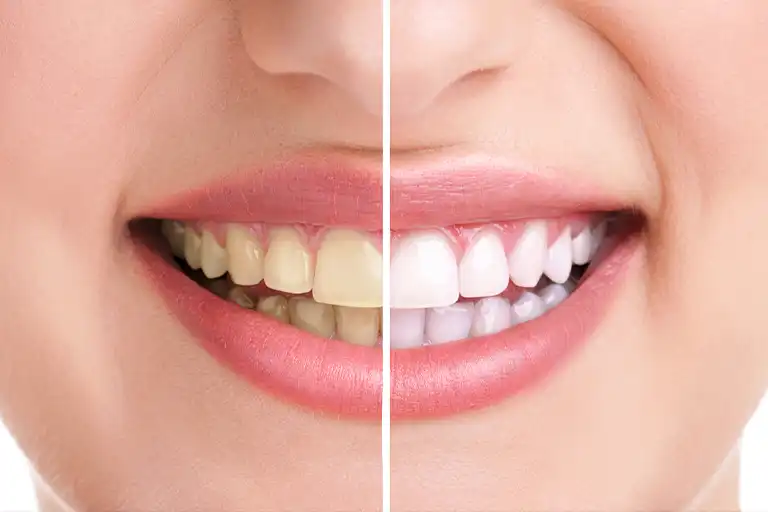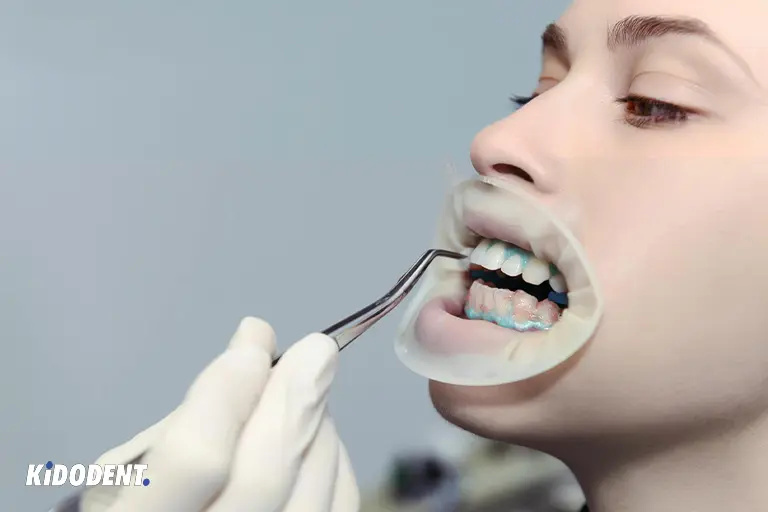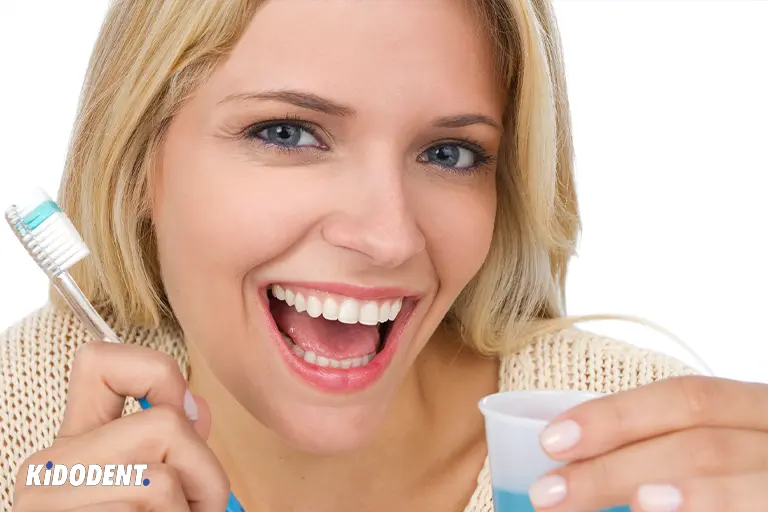What is hydrogen peroxide?
Hydrogen peroxide, chemically known as H₂O₂, is the common ingredient used in teeth whitening products. It is used as a popular tooth-whitener method for both home-use and in-office treatments to whiten teeth because of its bleaching properties.
Originally, Hydrogen peroxide is a strong colorless liquid, which is used as a bleaching agent, oxidizing agent, and as antiseptic (disinfecting agent).
Does hydrogen peroxide whiten teeth and how?
Yes, it does. Hydrogen peroxide is a powerful teeth whitening remedy. The mechanism of H₂O₂, or Hydrogen peroxide, is this: when it breaks apart, it produces free radicals that contain oxygen. As oxygen is an active bleaching molecule, it interacts with pigment (stain) molecules and whitens teeth.
Hydrogen peroxide VS carbamide peroxide
Another common ingredient found in teeth whitening products is carbamide peroxide.
Carbamide peroxide in its chemical formula will break down and form urea (carbamide) and hydrogen peroxide, so carbamide peroxide contains hydrogen peroxide in the chemical compound, which the rate can be 1:3. To make it simple, if you see that a product says it is formulated with, for example, 30% carbamide peroxide, this product has around 10% hydrogen peroxide.
If you think that there is a difference between these two in terms of teeth sensitivity and gum irritation, you should rather not. The main difference is in the chemical composition and the fact that hydrogen peroxide breaks down faster than the carbamide and, therefore, releases its whitening power earlier.
But they equally have excellent whitening efficacy which explains why it is the favorite bleaching agent used in whitening kits for at-home applications and dental clinics.

Is hydrogen peroxide safe as teeth whitening?
Yes, hydrogen peroxide is safe as long as used appropriately. The lower the concentration, the safer it is for your teeth. Using less concentration is safe and has lower risks of enamel damage and gum irritation.
Most at-home teeth whitening products contain 3 to 10 percent hydrogen peroxide. There are other products that are formulated with carbamide peroxide, which the percentage can be 35%. The wear time of these home whitening kits can range from 10 to 30 minutes per application in a recommended series of days.
It is required that you stick to the time and do not ever overuse tooth whiteners for more than the recommended period because the risks can outweigh the benefits.
Are there any side effects?
Teeth sensitivity is the most common side effect associated with hydrogen peroxide teeth whitening. Another issue is gingival (gum) irritation, which can be uncomfortable and lead to ulcerations when the peroxide gel touches your oral soft tissues. Teeth sensitivity is temporary and once you stop using the product or when you use a low concentration, the risks are reduced.
Gingival irritation can be prevented when the rubber dam is applied during in-office treatment. At-home whitening kits also use mouth trays to avoid gum irritations from the gel.
The risks of hydrogen peroxide increase when:
- You use higher concentration.
- You use the whitening product frequently and for a prolonged period. The length of time that peroxide gel, solution, or other forms remain on teeth is important since a longer time causes damage to the enamel of teeth.
- You don’t ask your dentist’s advice.
How about the hydrogen peroxide used by dentists?
Nothing is like teeth whitening done by the dentist in a professional treatment. If you want faster and safer teeth whitening, you should visit your dentist. They can use even higher percentage of hydrogen peroxide to remove tough tooth stains safely.
First thing first, dentists will clean off your teeth of any plaque buildups before your whitening treatment. Dentists will take other precautions and necessary pre- or post-whitening treatments to achieve desired results with less risk of teeth sensitivity and enamel damage. For example, they apply fluoride to help strengthen enamel and soothe sensitivity and use covers to prevent gum irritations.
How to use hydrogen peroxide to whiten teeth safely?
There are two ways to whiten teeth using hydrogen peroxide if you are looking for safer options.
In-office teeth whitening
Professional teeth whitening or in-office whitening treatment is the best way to try for having brighter teeth. You will have the advantages of a licensed dentist who whitens your teeth regarding your dental conditions and your oral health. It is the most expensive way of whitening teeth but can provide better results in the shortest amount of time.
Your dentist can even prescribe a series of home whitening treatments under their supervision when required or when you want to continue your treatment at home. They know what suits you best and which formula of peroxide is necessary.
At-home teeth whitening
There are a variety of over-the-counter whitening products which come in five common products. If you are interested in whitening your teeth at home with specially-made kits, you have several options with different costs for your needs. These products have gained popularity in recent years. They are made with lower peroxide percentages and can be found in different product ranges. They include:
- At-home teeth whitening kits
-
At-home kits are the most expensive ones on the list. These kits are made to provide the most effective results, which simulate the dentists’ treatment but for home usage. The kits come with whitening gels usually in serums and sometimes the LED device to activate the gel and speed up the process. See the best at-home whitening kits.
- Teeth whitening strips
-
Another popular product to whiten your teeth effectively at home is teeth whitening strips. You have a couple of strips with whitening gels on them. You just need to peel and apply the strips on your teeth for a recommended time.
- Teeth whitening pens
-
With a pen that contains whitening gel, teeth whitening seems like it has become much handier. Teeth whitening pens have made your job easier with little chance of mess and no more extra work. You have a whitening pen with a safe whitening gel that you can brush on the surface of your tooth or teeth that you want whitened.
- Whitening toothpaste
-
If you are looking for a lower percentage of hydrogen peroxide, you can try whitening toothpastes. You can simply brush your teeth while having a whitening experience.
- Whitening mouthwash
-
The lowest percentage of peroxide can be found in whitening mouthwashes. There is a small risk of gum or skin irritation, but this can be minimized by rinsing it off thoroughly. Using whitening mouthwash is not as effective compared to whitening kits or strips, so it is better to use them in conjunction with other products.

DIY peroxide for teeth whitening
There are other DIY teeth whitening ways that people can make the mixtures themselves. Although it may sound interesting to make your own peroxide solution or pate at home, these DIY methods are not recommended due to higher risks, and dentists’ consultation is a must.
How to make DIY hydrogen peroxide rinse?
Here are the steps to make your rinse at home:
- Step
You should mix one cup of hydrogen peroxide solution (3%) with an equal amount of water (1:1 ratio).
- Step
Swish the solution for 30 seconds to 1 minute.
- Step
After that, spit the solution out and be careful not to swallow any of the mixtures. It is recommended to add enough water because if the peroxide is not diluted as required, it can cause burns and irritation in the gums and your inner mouth skin.
Some people have another method as those that you may have seen on TikTok or Instagram.
- They dip a piece of clean cotton in the hydrogen peroxide solution and rub it on the teeth
- Then they let the solution remain on their teeth for 30 seconds to 1 minute
- Finally, they brush their teeth
How to make peroxide paste?
Another method is using baking soda and peroxide. You can:
- Mix a few teaspoons of baking soda (2 or 3 teaspoons) in a bowl with a small amount of hydrogen peroxide.
- Mix until the baking soda and peroxide is thick enough to form a paste.
- Put the paste on your teeth and slowly and carefully start brushing for 1 minute. Try as much not to let the paste come into contact with your gums since this is not like your normal toothbrushing with the daily toothpaste you use.
- Rinse off the paste under the running water and clean your mouth thoroughly with frequent rinsing and swishing.
The DIY hydrogen peroxide paste or rinse may be less expensive than other methods, but the increasing risks to teeth and gums are unavoidable. The rinse or paste can cause irreversible damage to enamel such as enamel erosion. So, it can put your oral health at risk, causing teeth sensitivity and sore gums with pain.
What causes tooth discoloration?
Teeth discolor due to many reasons like:
- Poor oral health
- Foods and drinks you consume, such as coffee, tea, carbonated drinks, sauces, carb-rich diets, high-sugar foods/drinks, and some fruits like berries or citrus fruits
- Smoking and tobacco use
- Certain medications, such as tetracycline
- Genetics or disorders
- Aging due to longtime wear and tear on the tooth’s enamel, the dentin underneath is exposed to higher risks
Are there alternatives to hydrogen peroxide?
If you are looking for a non-peroxide teeth whitening, Pthalimidoperoxycaproic acid (PAP) is another highly popular whitening formula that you can whiten your teeth effectively and professionally. The specially-made Pthalimidoperoxycaproic acid (PAP) is a bleaching alternative to try.
Teeth whitening brands like Hismile and Smile Avenue are based on PAP whitening formula.
The team behind Hismile teeth whitening products has developed PAP+ using ingredients such as hydroxyapatite and potassium citrate. Hydroxyapatite is a remineralizing agent that helps strengthen enamel and build lost minerals in teeth, while potassium citrate is a desensitizing ingredient to reduce teeth sensitivity, which is a common problem in teeth whitening.
Conclusion
Hydrogen peroxide is an effective and widely used tooth whitener that has been used in professional teeth whitening at dentists’ offices, too.
If used incorrectly, it can cause more harm than good. Serious damage to teeth and soft tissue burns are risks that should be kept in mind when you overuse any whitening products. See your dentist if you have selected to whiten your teeth. Your dentist can provide the best ways depending on the tooth discoloration you have.
Frequently asked questions
It all depends on the tooth discoloration and the type of treatment (home or in-office). For deeper ingrained stains, hydrogen peroxide can take longer than more superficial extrinsic stains to whiten teeth.
At-home whitening kits or strips usually need to be used once or twice a day for 14 days to work, while in-office treatments can give you noticeable results in just 1 or 2 sessions.
The duration of peroxide-based teeth whitening can be different from person to person and from one product to another.
Yes, if used inappropriately. Hydrogen peroxide can leave extensive damage to the enamel of teeth with overuse and without dentists’ provision.
The rinse can cause gingival or soft tissue burns, so it is recommended that you dilute it in water to prevent burns when swishing. And if you are using other gel-based home products, keep up with the recommended time. Also, be careful to consult with your dentist to prevent any unwanted damage to your teeth.

1 Comment
One of the best informative post regarding teeth whitening. I got to know many rare things from this post.